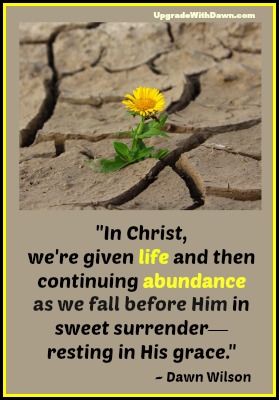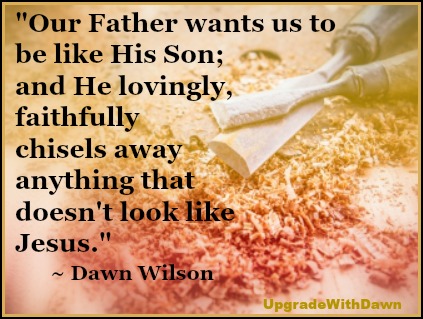When Faith's Song Goes Silent
When I think of Cynthia Ruchti, I think of hope and wisdom. It's the hallmark of her life and ministry. In this Spiritual Growth UPGRADE, she calls us to value the unique song of silence.
“What happens," Cynthia says, "when faith’s song goes silent? Or is missing key notes? Or grates on our nerves because it feels out of tune?”
Oh, how well I (Dawn) remember a whole long year when faith's song felt out of tune. I was miserable and depressed. And I know what Cynthia says is true.
Cynthia continues . . .
Many of us express our faith in song:
- He’s a Good, Good Father
- I’m Standing on the Promises of God
- He’s All I Need
- How Great Is Our God
- This Is Amazing Grace
- Blessed Assurance, Jesus Is Mine
But the heart doesn’t always feel like singing, at least not an upbeat, confident, triumphant song.
Life’s circumstances can threaten to turn our “praise songs that work great for cardio exercises” into a dirge, a lament, or a barely-hanging-on-how-miserable-can-this-get? blues tune.
Every time we open to the book of Psalms in the Bible, we’re reminded it’s not a twenty-first century problem. Listen to the way the psalmist David intertwined the wrestlings of his faith with the truths that held him in their grip:
“Get me out of this net that’s been set for me because you are my protective fortress” (Psalm 31:4 CEB).
“I rejoice and celebrate in your faithful love because you saw my suffering—you were intimately acquainted with my deep distress” (Psalm 31:7 CEB).
“Have mercy on me, Lord, because I am depressed. My vision fails because of my grief, As do my spirit and my body ...
"Strength fails me ...
"I’m a joke to all my enemies ... I scare my friends, And whoever sees me in the street Runs away ...
"I am forgotten, like I’m dead, Completely out of my mind ...
"But me? I trust you, Lord! I affirm, ‘You are my God.’ My future is in your hands” (Psalm 31:9-15 CEB).
No matter how long the lament, how soul-rattling its lyrics, how far distanced from hope its tune, the song turns from minor key to major when the Truth gets its solo.
When faith’s song seems to have gone silent, for whatever logical or unexplainable reason, we have options:
- Listen to the fear-inducing noise our rusty, creaking soul makes in the hollow, silent spaces.
- Listen to the unbelieving or skeptical world that claims silence is a sign of God’s absence, despite reassurances to the contrary in God’s never-silent, never-will-I-leave-you-or-forsake-you Word.
- Realize that silence is its own song.
My music educator father often said, “Play the rests with as much intensity and focus as you do the  notes on the page. Rests are not moments of nothingness. Play the rests.”
notes on the page. Rests are not moments of nothingness. Play the rests.”
When only twenty-two, the hymn writer Robert Robinson penned these faith-gone-silent words in 1757. How true they ring today.
“Prone to wander, Lord I feel it, prone to leave the God I love.”
Listen for the significant, pregnant-with-promise moment of silence after that familiar confession in this modern version (video) at the 5:15 mark. It will steal your breath, and steel your resolve to keep listening in the silence.
Do you value the silence or fear it? And if your answer is fear, reflect on the “and”—the moment of resting and regrouping—in Psalm 46:10.
“Be still, and know that I am God.”
Unlike many other verses in the Bible, these eight words appear without alteration in translation after translation. These words.
Stillness—or silence—was prescribed by God as a prelude, or an accompaniment, to knowing He is God, and finding our rest and courage in that truth. Is it in part because a whisper sounds loud in the silence?
So I’ll ask again, and prepare myself to answer the questions honestly too.
Do you value silence?
Have you heard its song?
What did it teach you?
 Cynthia Ruchti tells stories hemmed in hope. She’s the award-winning author of more than eighteen books and a frequent speaker for women’s ministry events.
Cynthia Ruchti tells stories hemmed in hope. She’s the award-winning author of more than eighteen books and a frequent speaker for women’s ministry events. She and her husband live in the heart of Wisconsin. Connect with her at cynthiaruchti.com or hemmedinhope; or check out her recent release—Song of Silence.
She and her husband live in the heart of Wisconsin. Connect with her at cynthiaruchti.com or hemmedinhope; or check out her recent release—Song of Silence.
Graphic of bench, courtesty of Morguefile.
 1 Comment → Posted on
1 Comment → Posted on  Thursday, August 4, 2016 at 7:40AM
Thursday, August 4, 2016 at 7:40AM  Be Still,
Be Still,  Cynthia Ruchti,
Cynthia Ruchti,  Faith,
Faith,  Faith's song,
Faith's song,  Music,
Music,  Silence,
Silence,  Song of Silence,
Song of Silence,  Sounds of Silence,
Sounds of Silence,  Upgrade with Dawn Upgrade Your Life
Upgrade with Dawn Upgrade Your Life  Knowing God,
Knowing God,  Relationship with God,
Relationship with God,  Spiritual Life
Spiritual Life 











